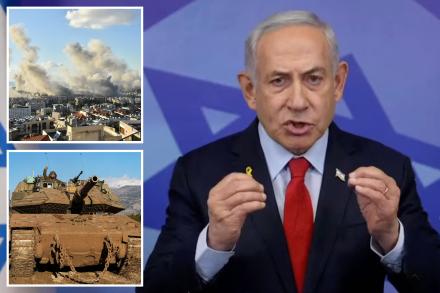By Agency Report
Israeli Prime Minister, Benjamin Netanyahu said on Tuesday November 26, that he is ready to implement a ceasefire deal with Lebanon.
Netanyahu further said he would respond forcefully to any violation by Hezbollah, declaring that Israel would retain “complete military freedom of action.”
- ICC issues arrest warrants for Netanyahu, Gallant and Hamas Commander
- Again, Benjamin Netanyahu takes oath as Israel’s prime minister
- Israel will avenge Hamas’ attacks- Netanyahu vows
Israeli TV reported that the Israeli security cabinet had earlier approved the deal, saying that the accord would clear the way for an end to a conflict across the Israeli-Lebanese border that has killed thousands of people since it was ignited by the Gaza war last year.
“We will enforce the agreement and respond forcefully to any violation. Together, we will continue until victory,” Netanyahu said.
“In full coordination with the United States, we retain complete military freedom of action. Should Hezbollah violate the agreement or attempt to rearm, we will strike decisively.”
“We have set it back decades, eliminated … its top leaders, destroyed most of its rockets and missiles, neutralized thousands of fighters, and obliterated years of terror infrastructure near our border,” he said.
“We targeted strategic objectives across Lebanon, shaking Beirut to its core.”
The Lebanon ceasefire agreement requires Israeli troops to withdraw from south Lebanon and Lebanon’s army to deploy in the region, officials say. Hezbollah would end its armed presence along the border south of the Litani River.
Israeli approval of the deal would pave the way for a ceasefire declaration by U.S. President Joe Biden and French President Emmanuel Macron, according to four senior Lebanese sources.
Biden, who made remarks at the White House shortly after Israel’s security cabinet approved the agreement in a 10-1 vote, said he had spoken to Israel’s Prime Minister Benjamin Netanyahu and Lebanon’s caretaker Prime Minister Najib Mikati. Fighting would end at 4 a.m. local time (0200 GMT), he said.
A Hezbollah parliament member in Lebanon, Hassan Fadlallah, said the country faced “dangerous, sensitive hours” during the wait for a possible ceasefire announcement.
He said Hezbollah, which is backed by Iran and allied to Hamas, was considerably weaker than it had been at the start of the conflict.

